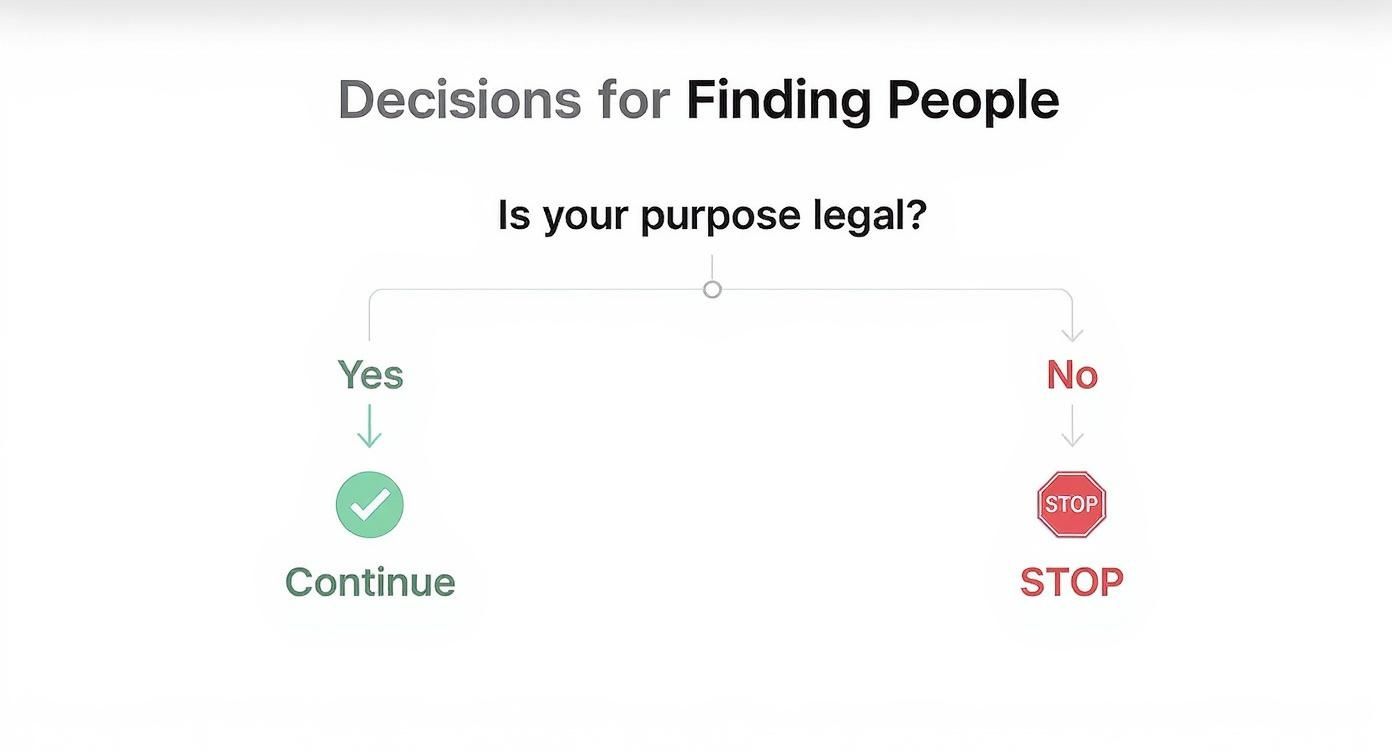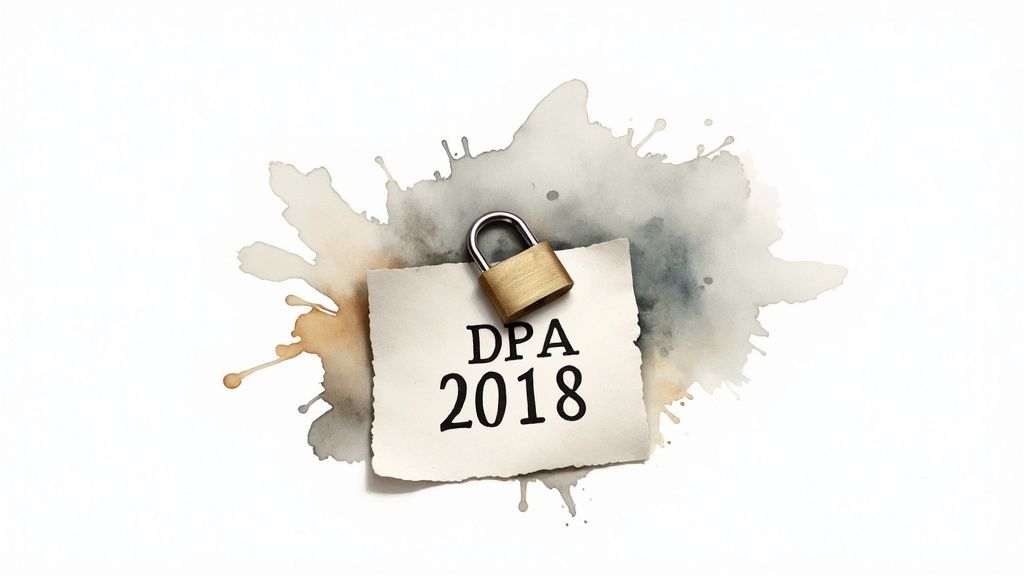Before diving in, it’s crucial to understand the two pillars of finding information about someone: staying within the law and upholding ethical standards. Your success will depend on actionable steps: using publicly available data, applying clever online searching, and knowing when to call in a professional.
Your Guide to Finding People Responsibly
Trying to find information about someone can feel like a huge undertaking. You might be reconnecting with a long-lost family member, vetting a new business partner, or digging into your family tree. Whatever the reason, you need actionable, reliable methods from the start.
This guide provides a practical framework for using lawful methods in the UK. We’ll focus on the critical difference between public data and protected private information. Knowing where that line is isn’t just about ticking legal boxes; it’s about conducting your search with respect and integrity.
Define Your Purpose and Legal Boundaries
First things first: you must be crystal clear on why you’re looking for this information. A legitimate purpose is the bedrock of any ethical search. For example, tracking down an old school friend is an acceptable reason; gathering information to harass someone is entirely different—and illegal.
Actionable Insight: A cornerstone of responsible information gathering is the ability to critically evaluate information sources to ensure accuracy and mitigate bias. Before you start, write down your reason for the search. If you wouldn’t feel comfortable explaining it to a third party, you should reconsider.
The decision tree below gives you a simple, clear starting point for any search you’re considering.

As this visual makes clear, there’s one non-negotiable rule: if your intent isn’t lawful, stop right there. The search must not go ahead.
Your Search Toolkit
Once you have a legitimate goal in mind, you can start exploring the various tools available. This guide will walk you through several key methods for building a complete picture, all while staying on the right side of the law:
- Public Databases: Learn how to access official records, from the electoral roll to Companies House, for verified facts.
- Online Search Techniques: We’ll go beyond a basic name search to show you actionable search commands to uncover a person’s public digital footprint.
- Professional Services: Sometimes a search is just too complex or requires access you don’t have. It’s vital to recognise when you need an expert. For these tricky cases, professional services to trace a person can deliver verified results and guarantee full legal compliance.
By sticking to these guidelines, you can move forward with your search, confident that you’re doing it effectively and, most importantly, responsibly.
Accessing UK Public Records and Official Databases
When you need to find verified information about someone for a legitimate reason, UK public records are your most powerful tool. These official databases offer a legal first step, packed with factual data that can confirm addresses, pin down business interests, and verify property ownership.
To use them effectively, you need a plan. Don’t just search aimlessly. Understand what each database offers and target your search to save time and get clear answers. This is about strategic investigation, not endless scrolling.
Find Current and Past Addresses with the Electoral Roll
One of the most reliable sources for confirming where someone lives is the electoral roll. It’s a list of everyone in the UK registered to vote, making it a fantastic tool for address verification.
There are two versions: the full register (access is tightly controlled) and the open register (available through various paid online services).
Actionable Step: For a free method, you can view the full, current register in person at your local council’s electoral registration office. You’ll need to book an appointment and may be asked for your reason. This is a great way to confirm if someone is at a specific address, but you usually can’t make copies.
For more complex searches, particularly for tracking down past addresses, you might find our detailed guide on how to find a person’s address especially helpful.
The government’s official page is the right place to start, as it provides clear guidance on how to get in touch with your local electoral register office.

As you can see from this screenshot of the GOV.UK portal, the primary free method involves physically visiting your local council to arrange a viewing.
Investigate Business Interests Through Companies House
If the person you’re researching owns a business or is a company director, your next stop should be Companies House. This is the UK’s official registrar of companies and a completely free resource.
Actionable Step: Go to the Companies House website and search the person’s name under the “Officers” tab. This will reveal:
- Directorships: A full list of every UK limited company where they are, or have been, a director.
- Company Details: The company’s status (active or dissolved), its registered address, and its entire filing history.
- Personal Information: The director’s correspondence address, their month and year of birth, and their nationality.
Imagine you’re vetting a potential business partner. A quick search on Companies House could reveal their entire corporate history. A string of dissolved companies, for instance, might be a red flag worth looking into more deeply.
Uncover Legal History with Court and Insolvency Records
Court records can offer a window into someone’s involvement in legal disputes. You can search for judgements, orders, and fines online through official registries. This is especially useful for checking for County Court Judgements (CCJs), a clear sign of unpaid debt.
Similarly, the Individual Insolvency Register is a public database you can search for free. It lists anyone who is currently bankrupt or has a formal debt solution.
Actionable Insight: A quick, free search on the Insolvency Register can provide critical financial insight. If someone has a history of bankruptcy, it’s a significant piece of information, whether you’re considering them for a tenancy, a business partnership, or a personal loan.
The process of gathering official information also extends into government enforcement. For instance, efforts to verify an individual’s legal right to work in the UK show how data collection is used for immigration control. Between October 2024 and September 2025, Immigration Enforcement conducted its largest crackdown on illegal working, carrying out over 11,000 raids that resulted in more than 8,000 arrests. This large-scale initiative highlights how systematic verification of personal information is a key tool for public policy. You can read the full report on these enforcement actions on the official government website.
Navigating UK public records can be overwhelming. Use this cheat sheet to target your search effectively.
UK Public Records Search Cheat Sheet
| Record Type | Information You Can Find | Where to Search |
|---|---|---|
| Electoral Roll | Current and historical addresses, confirmation of residency | Local council electoral registration office (in person), paid online services |
| Companies House | Directorships, company status, registered addresses, director’s birth month/year | Companies House (free online) |
| Court Records | County Court Judgements (CCJs), fines, some tribunal decisions | Trust Online for CCJs, official court search portals |
| Insolvency Register | Bankruptcies, Debt Relief Orders, Individual Voluntary Arrangements (IVAs) | The Insolvency Service (free online) |
| HM Land Registry | Property ownership, price paid (post-April 2000), mortgage lenders | HM Land Registry (small fee per document) |
This table covers the key databases that will answer most initial questions you might have.
Verify Property Ownership with HM Land Registry
If you need definitive proof of who owns a property in England or Wales, HM Land Registry is the place to go. For a small fee, typically around £3 per document, you can download a copy of the title register.
Actionable Step: Visit the HM Land Registry website, enter the property address, and purchase the title register. This official document will tell you:
- The names of the legal owners.
- The price paid for the property if it was bought after April 2000.
- Details of any mortgage lender who has a charge on the property.
This is incredibly useful for property disputes or simply confirming ownership claims, providing official, undeniable proof.
Mastering Online Searches and Social Media
When official records draw a blank, the internet is your next port of call. But a simple name search in Google is rarely enough. To get real, actionable information, you need to think like a detective, using strategic search techniques to navigate the digital footprints people leave behind.
This is about skilfully piecing together publicly available puzzle pieces from forums, news articles, and social media to build a detailed picture—all without crossing ethical lines.

Unlocking Advanced Search Engine Techniques
The real power of search engines lies in using specific commands, called search operators, to narrow your results and unearth information that would otherwise be buried.
Actionable Steps: Here are a few of the most useful operators to get you started:
- Quotation Marks (“”): To find an exact phrase, search for “John Smith”. This filters out pages that only mention ‘John’ or ‘Smith’ separately.
- Site Operator (site:): To search a specific website, use a query like “John Smith” site:university.ac.uk. This restricts results to that domain.
- Filetype Operator (filetype:): To find specific documents like a CV or report, try “John Smith” filetype:pdf.
The real magic happens when you combine them. A query like “John Smith” accountant filetype:pdf site:linkedin.com becomes incredibly specific, targeting only PDF profiles of accountants named John Smith on LinkedIn. For more in-depth strategies, our guide on how to locate someone using just their name has plenty more practical tips.
Ethically Analysing Social Media Profiles
Social media is a goldmine of public information, but you must approach it as a passive observer, not an intruder. Never try to circumvent privacy settings. While tools like a Snapchat story viewer exist for viewing public content, you must always stay within a platform’s terms of service.
Actionable Steps: Focus on what the person has actively chosen to share publicly:
- LinkedIn: Scrutinise their career history, education, skills, and any articles they’ve published to build a professional timeline.
- Facebook and Instagram: Look at their public posts, photos, and group memberships to confirm identity and learn about their interests.
- X (Twitter): As a platform built on public conversation, X is fantastic for gauging someone’s opinions and professional interests.
Actionable Insight: The golden rule is simple: if you have to break a privacy setting to see it, you’ve gone too far. Stick to what is freely and publicly available. Prying is not only unethical; it can also land you in legal trouble.
A Real-World Scenario: Connecting the Dots
Let’s put this into practice. Imagine you want to find an old university friend, “Sarah Jenkins,” who you knew studied marketing at the University of Leeds around 2010.
Action Plan:
- Start with a targeted Google search: “Sarah Jenkins” “University of Leeds” marketing. This might bring up an old alumni newsletter.
- Pivot to LinkedIn using a site operator: “Sarah Jenkins” site:linkedin.com/in/. Use LinkedIn’s filters to narrow by university and graduation date.
- Once you find a promising profile, cross-reference it. Check her public Facebook or Instagram. Does she mention mutual friends or places from Leeds? Is she in any university alumni groups?
By methodically piecing these public clues together, you can confidently confirm you’ve found the right person.
When It’s Time to Call in the Professionals
While DIY searches can uncover a surprising amount, there are situations where they fall short. For high-stakes decisions requiring legal certainty and verified data, only a professional service will do. This is the moment to bring in experts.
Knowing when to make that switch is key. It’s about ensuring accuracy, legal compliance, and avoiding serious risks. Professional background check services are designed for scenarios where the information must be legally obtained and unquestionably correct.
Telltale Signs You Need a Professional Service
If you find yourself in any of these situations, a professional check is essential. DIY methods often hit a legal wall or lack access to verified data.
- Pre-Employment Screening: When hiring, a formal background check is non-negotiable to verify identity, right to work, and any relevant criminal history that could put your business at risk.
- Vetting Potential Tenants: A professional check goes beyond references, digging into a tenant’s credit and rental history to flag past evictions or court judgments, giving you a clear picture of their reliability.
- Business Due Diligence: Before entering a partnership or making a major investment, you need to be sure who you’re dealing with. Professionals can investigate the financial and legal track record of people and businesses, uncovering hidden liabilities.
In these cases, the goal is to base your decision on verified facts, not gut feelings. The cost of a bad hire or a fraudulent business partner is almost always far greater than the cost of a professional check.
The Professional Advantage: Access and Compliance
What can professional services do that you can’t? It boils down to two things: authorised access to restricted databases and deep expertise in legal compliance.
A professional service can legally access information from sources off-limits to the public, including detailed credit files, comprehensive criminal record data via the Disclosure and Barring Service (DBS), and other official identity databases. You can explore the specifics of what a professional background check includes in our detailed guide.
Actionable Insight: The value of a professional service isn’t just the information it finds, but how it lawfully provides it. They act as a regulated middleman, ensuring every piece of data is obtained in strict compliance with GDPR, removing legal risk from your shoulders.
This legal shield is crucial. If you were to obtain sensitive information improperly, you could face serious legal trouble. Using a reputable service gives you a compliant, defensible report you can act on with confidence. The background check services industry in the UK has seen steady growth, a trend expected to continue through 2030 as more businesses seek to manage risk. You can find more insights on the growth of this industry from IBISWorld.
Choosing the Right UK Background Check Service
Not all background check services are created equal. The quality and legality of your report depend on the provider’s credibility.
Actionable Checklist:
- Look for Accreditations: Are they registered with the Information Commissioner’s Office (ICO)? This is a basic but crucial sign of a legitimate operation.
- Understand What You’re Getting: Ask for a clear breakdown of what their checks include. Ensure the service matches your specific needs.
- Confirm GDPR Compliance: Ask them directly how their processes comply with UK data protection laws. A trustworthy service will have a clear answer.
- Check Reviews and Testimonials: See what other clients say to gauge the company’s reliability and customer service.
Hiring a professional is a strategic move for when you need verified, legally sound intelligence.
Navigating Data Protection and UK Privacy Laws
Whenever you look for information about someone, you are operating under strict legal rules. Handling personal data means every action falls under UK privacy laws. Getting this right is not optional—it’s essential.

The two key laws are the Data Protection Act 2018 and the UK General Data Protection Regulation (UK GDPR). These define what personal data is and set the rules for how it can be collected and used. Ignoring them can lead to massive fines and even criminal charges.
Understanding Your Legal Obligations
The core principle is having a lawful basis to process someone’s data. For a private individual, the most common justification is ‘legitimate interest’. This means your reason for searching must be genuine and necessary, and it must not override the fundamental rights of the person you’re researching. For example, tracing a relative to settle a will is likely a legitimate interest. Stalking an ex-partner is not.
Actionable Insight: Before you start, perform a ‘gut check’. Ask yourself: Is my reason for searching reasonable, proportional, and fair? Can I clearly articulate why I need this information? If you hesitate, you could be on thin legal ice. Document your reasoning.
Your Do’s and Don’ts Checklist
To stay compliant, follow these simple rules:
- DO stick to publicly available information, such as public records and news articles.
- DON’T ever try to access private accounts, emails, or messages without explicit consent. This is a major red line.
- DO be upfront about your intentions if you make contact with the person.
- DON’T share any personal information you find with others unless there is a solid, legitimate reason.
- DO securely delete any personal data you’ve gathered once your reason for having it is over.
If your search is complex or you feel out of your depth with the legal side, stop and get professional advice from a solicitor or a licensed private investigator to ensure your search is fully compliant.
The Future of Information Gathering
The way we gather information is changing at breakneck speed. Technology is constantly delivering new tools for finding and verifying personal details, making the process faster and more precise. This is especially true for formal background checks, where speed and accuracy are critical.
Artificial intelligence (AI) is leading this transformation. AI-powered platforms can now analyse enormous datasets in seconds, flagging discrepancies that a human researcher might miss. This isn’t science fiction; it’s already reshaping how professional verifications are done in the UK.
The Rise of AI and Digital Identity Tools
AI algorithms act as tireless digital assistants, combing through public records and online sources to build a clear profile of a person. They can automatically cross-reference work history, confirm qualifications, and pinpoint conflicting details, ensuring decisions are based on verified facts.
Simultaneously, digital identity tools using biometrics like facial recognition are becoming standard. These systems securely confirm someone’s identity remotely, replacing the need for physical documents.
The real benefit of these tools is their blend of speed and security. A background check that once took weeks can now be completed in minutes on a smartphone, with far greater protection against identity fraud.
This innovation is reshaping the UK’s background screening landscape. By 2025, the integration of AI into background checks is expected to be well-established. For example, companies like 321GoCheck use AI to accelerate employment verifications, helping employers make smarter decisions while respecting privacy laws.
Behind simple user interfaces, complex AI is doing the heavy lifting to verify information quickly and securely.
Balancing Innovation with Privacy
While these advancements bring incredible efficiency, they also place a spotlight on data privacy. Handling personal information with AI and biometrics is tightly regulated by UK GDPR and the Data Protection Act 2018. Companies using these technologies must demonstrate robust security and a clear, lawful reason for processing sensitive data.
The truth is simple: as our tools become more powerful, our responsibility to use them ethically grows. The future is not just about getting information faster; it’s about doing so in a way that respects individual privacy at every turn. For anyone involved in online research, understanding the legal framework is non-negotiable. You can get a deeper understanding by reading our guide on what cyber investigation in the UK involves.
Your Questions Answered
When you start digging for information on someone in the UK, a few key questions almost always pop up. Here are some quick, practical answers to the most common queries I hear, making sure we stay on the right side of the law.
Is It Actually Legal to Look Up Someone’s Details in the UK?
Yes, it is legal as long as you stick to publicly available information. This includes sources like the open electoral roll, public social media profiles, and business filings on Companies House.
The legal line is drawn at privacy. The Data Protection Act 2018 and UK GDPR are clear: you cannot attempt to access private emails, sealed records, or any other confidential information without permission. Doing so is a serious legal breach.
What Can I Genuinely Expect to Find for Free?
With persistence, you can often find a surprising amount for free:
- Current or past addresses by visiting a local council office to view the electoral roll.
- Company directorships and business details via a free search on Companies House.
- Property ownership records through the HM Land Registry, though this requires a small fee per document.
- Public social media posts that can provide clues about a person’s work history, interests, and connections.
The key takeaway is that free methods require your time and effort. You are a detective piecing together a puzzle. The completeness of the picture depends on what information is publicly available.
When Is It Time to Call in a Professional?
It’s time to hire a professional when you’ve hit a dead end, or when the information is critical for a major legal or business decision. If you feel you are entering a legal grey area, that’s another clear signal to stop.
For any official purpose—like pre-employment screening, tenant vetting, or business due diligence—a professional service is essential. They have compliant access to specialised databases for credit reports and criminal record checks, providing verified, actionable, and legally obtained intelligence that you cannot get on your own.
If you’ve taken your own search as far as it can go or you need verified information for a critical decision, UK Private Investigators offers professional, discreet, and legally compliant services to bring you the clarity you’re looking for. Learn more about how we can help.

